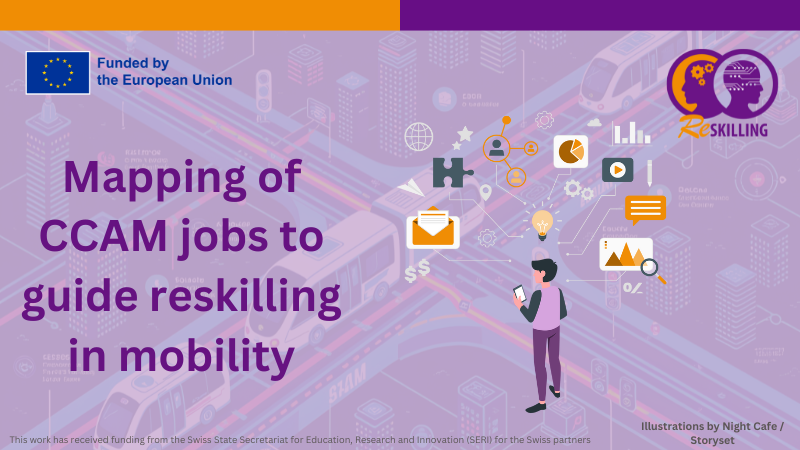We are mapping CCAM jobs to guide reskilling in mobility!

As Connected, Cooperative, and Automated Mobility (CCAM) technologies reshape the transport landscape, understanding how they impact the workforce is essential.
Within the ReSKILLING project, we mapped the CCAM value chain and associated job families to identify which roles are evolving, emerging, or at risk and to guide targeted reskilling and upskilling strategies. This work ensures that future mobility systems are not only technologically advanced but also socially inclusive and economically viable.
“Roles such as drivers, construction workers, and ticket issuers are evolving toward more technical and supervisory functions due to automation.”
This mapping addresses the urgent need for a structured approach to workforce transformation in the mobility sector. It is not just a mere categorization but rather a strategic tool to support workforce transformation. It enables policymakers, educators, and industry stakeholders to anticipate skill needs, potentially design inclusive training programs that accommodate such needs, and ensure that no worker is left behind in the transition to CCAM.
The value chain includes nine functional stages: from design and manufacturing to policy, market development, and education. Each stage hosts specific roles, such as engineers, software developers, remote operators, urban planners, and ethics experts. By consolidating 99 job profiles into 32 strategic job families, we provide an actionable framework to guide reskilling efforts across the entire CCAM value chain. Importantly, the mapping also highlights roles that are often overlooked in tech-driven analyses, such as parking enforcement officers, toll collectors, and mobility assistants, whose functions are evolving with automation and digitalization. The analysis also acknowledges the growing importance of support roles and remote workers. These professionals are essential to the seamless operation and accessibility of CCAM systems, ensuring that services remain responsive, inclusive, and resilient across both physical and digital environments. Their contribution is key to maintaining user trust, operational continuity, and equitable access to mobility services.
“By consolidating 99 job profiles into 32 strategic job families, we provide a clear and actionable framework to guide reskilling efforts across the entire CCAM value chain.”
Moreover, the mapping reveals how CCAM is not only transforming job content but also reshaping the way work is organised and delivered. Hybrid and remote work models are becoming more prevalent, especially in roles such as remote vehicle operators, digital infrastructure monitors, and customer support agents. All these shifts demand new digital competencies and soft skills, such as remote collaboration, data literacy, and adaptability. Recognising and supporting these changes is crucial to ensure that workers are comfortable and thrive in increasingly decentralised and tech-mediated environments.
The mapping that ReSKILLING has conducted lays the foundation for a more resilient and adaptable transport workforce. By aligning job roles with CCAM value chain stages and skill levels, we can support the preparation of Europe’s mobility sector for the future, one that is not only connected, cooperative, and automated, but also human-centered and inclusive.